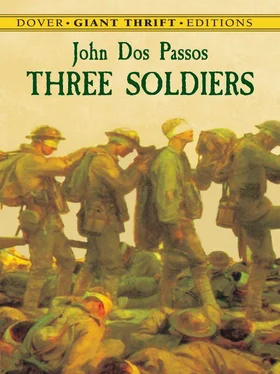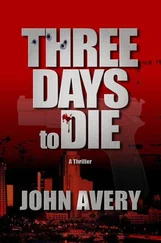When he got off the car at St. Germain, he had stopped formulating his thoughts; soggy despair throbbed in him like an infected wound.
He sat for a while at the café opposite the château looking at the light red walls and the strong stone-bordered windows and the jaunty turrets and chimneys that rose above the classic balustrade with its big urns on the edge of the roof. The park, through the tall iron railings, was full of russet and pale lines, all mist of new leaves. Had they really lived more vividly, the people of the Renaissance? Andrews could almost see men with plumed hats and short cloaks and elaborate brocaded tunics swaggering with a hand at the sword hilt, about the quiet square in front of the gate of the Château. And he thought of the great, sudden wind of freedom that had blown out of Italy, before which dogmas and slaveries had crumbled to dust. In contrast, the world today seemed pitifully arid. Men seemed to have shrunk in stature before the vastness of the mechanical contrivances they had invented. Michael Angelo, da Vinci, Aretino, Allini; would the strong figures of men ever so dominate the world again? Today everything was congestion, the scurrying of crowds; men had become ant-like. Perhaps it was inevitable that the crowds should sink deeper and deeper in slavery. Whichever won, tyranny from above, or spontaneous organization from below, there could be no individuals.
He went through the gates into the park, laid out with a few flower beds where pansies bloomed; through the dark ranks of elm trunks, was brilliant sky, with here and there a moss-green statue standing out against it. At the head of an alley he came out on a terrace. Beyond the strong curves of the pattern of the iron balustrade was an expanse of country, pale green, falling to blue towards the horizon, patched with pink and slate-colored houses and carved with railway tracks. At his feet the Seine shone like a curved sword blade.
He walked with long strides along the terrace, and followed a road that turned into the forest, forgetting the monotonous tread mill of his thoughts, in the flush that the fast walking sent through his whole body, in the rustling silence of the woods, where the moss on the north side of the boles of the trees was emerald, and where the sky was soft grey through a lavender lacework of branches. The green gnarled woods made him think of the first act of Pelléas. With his tunic unbuttoned and his shirt open at the neck and his hands stuck deep in his pockets, he went along whistling like a school boy. After an hour he came out of the woods on a highroad, where he found himself walking beside a two-wheeled cart, that kept pace with him exactly, try as he would to get ahead of it. After a while, a boy leaned out:
“Hey, l’Américain, vous voulez monter?”
“Where are you going?”
“Conflans Ste.-Honorine.”
“Where’s that?”
The boy flourished his whip vaguely towards the horse’s head.
“All right,” said Andrews.
“These are potatoes,” said the boy, “make yourself comfortable.”
Andrews offered him a cigarette, which he took with muddy fingers. He had a broad face, red cheeks and chunky features. Reddish-brown hair escaped spikily from under a mud-spattered beret.
“Where did you say you were going?”
“Conflans-Ste.-Honorine. Silly all these saints, aren’t they?”
Andrews laughed.
“Where are you going?” the boy asked.
“I don’t know. I was taking a walk.”
The boy leaned over to Andrews and whispered in his ear:
“Deserter?”
“No… I had a day off and wanted to see the country.”
“I just thought, if you were a deserter, I might be able to help you. Must be silly to be a soldier. Dirty life… But you like the country. So do I. You can’t call this country. I’m not from this part; I’m from Brittany. There we have real country. It’s stifling near Paris here, so many people, so many houses.”
“It seems mighty fine to me.”
“That’s because you’re a soldier. Better than barracks, hein? Dirty life that. I’ll never be a soldier. I’m going into the navy. Merchant marine, and then if I have to do service I’ll do it on the sea.”
“I suppose it is pleasanter.”
“There’s more freedom. And the sea… We Bretons, you know, we all die of the sea or of liquor.”
They laughed.
“Have you been long in this part of the country?” asked Andrews.
“Six months. It’s very dull, this farming work. I’m head of a gang in a fruit orchard, but not for long. I have a brother shipped on a sailing vessel. When he comes back to Bordeaux, I’ll ship on the same boat.”
“Where to?”
“South America, Peru; how should I know?”
“I’d like to ship on a sailing vessel,” said Andrews.
“You would? It seems very fine to me to travel, and see new countries. And perhaps I shall stay over there.”
“Where?”
“How should I know? If I like it, that is… Life is very bad in Europe.”
“It is stifling, I suppose,” said Andrews slowly, “all these nations, all these hatreds, but still… it is very beautiful. Life is very ugly in America.”
“Let’s have something to drink. There’s a bistro!”
The boy jumped down from the cart and tied the horse to a tree. They went into a small wine shop with a counter and one square oak table.
“But won’t you be late?” said Andrews.
“I don’t care. I like talking, don’t you?”
“Yes, indeed.”
They ordered wine of an old woman in a green apron who had three yellow teeth that protruded from her mouth when she spoke.
“I haven’t had anything to eat,” said Andrews.
“Wait a minute.” The boy ran out to the cart and came back with a canvas bag, from which he took half a loaf of bread and some cheese.
“My name’s Marcel,” the boy said when they had sat for a while sipping wine.
“Mine is Jean… Jean André.”
“I have a brother named Jean, and my father’s name is André. That’s pleasant, isn’t it?”
“But it must be a splendid job, working in a fruit orchard,” said Andrews, munching bread and cheese.
“It’s well paid; but you get tired of being in one place all the time. It’s not as it is in Brittany… ” Marcel paused. He sat, rocking a little on the stool, holding on to the seat between his legs. A curious brilliance came into his grey eyes. “There,” he went on in a soft voice, “it is so quiet in the fields, and from every hill you look at the sea… I like that, don’t you?” he turned to Andrews, with a smile.
“You are lucky to be free,” said Andrews bitterly. He felt as if he would burst into tears.
“But you will be demobilized soon; the butchery is over. You will go home to your family. That will be good, hein?”
“I wonder. It’s not far enough away. Restless!”
“What do you expect?”
A fine rain was falling. They climbed in on the potato sacks and the horse started a jog trot; its lanky brown shanks glistened a little from the rain.
“Do you come out this way often?” asked Marcel.
“I shall. It’s the nicest place near Paris.”
“Some Sunday you must come and I’ll take you round. The Castle is very fine. And then there is Malmaison, where the great Emperor lived with the Empress Joséphine.”
Andrews suddenly remembered Jeanne’s card. This was Wednesday. He pictured her dark figure among the crowd of the pavement in front of the Café de Rohan. Of course it had to be that way. Despair, so helpless as to be almost sweet, came over him.
“And girls,” he said suddenly to Marcel, “are they pretty round here?”
Marcel shrugged his shoulders.
“It’s not women that we lack, if a fellow has money,” he said.
Читать дальше












